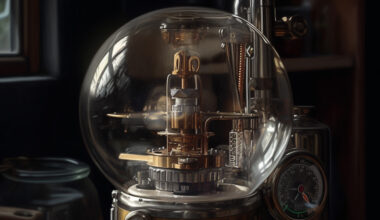Taking time out from Fuck Buttons, Benjamin John Power has unleashed another Blanck Mass album. It’s called ‘Dumb Flesh’ and unleash is the operative word…
“I think I work in a very naive way. I’ll experiment until I come across a sound or a rhythm or a texture that I’m interested in and I build backwards from there. It can be literally one tiny loop that I start off with, then things start to grow around it. That’s how tracks come together for me. Structure is often the very last thing I do. Essentially, it works like a kind of reverse pyramid. God, that sounds fucking terrible, doesn’t it?”
I’m saying nothing. I’m way too polite. In this instance, I’m also ready to forgive Benjamin John Power’s slide into muso boffin claptrap. Because Benjamin John Power, aka Blanck Mass, does actually know what he’s talking about when it comes to backwards stuff. Take the opening track on ‘Dumb Flesh’, the new Blanck Mass album. It’s called ‘Loam’ and it’s mostly backwards. It’s backwards and time-stretched and multi-layered and generally slurred and twisted to the point where it’s a very unpleasant and uncomfortable listen. It took me four attempts to make it beyond 30 seconds. And this isn’t some wacky little intro piece, by the way. It’s a fully realised track lasting four minutes. Four. Bloody. Minutes.
There are several other things I need to tell you about ‘Loam’. Firstly, by the time you get to the halfway point, your ears are gradually tuning in and the ugly mess starts to sound strangely melodic. Secondly, if you have the technology to stick it in reverse, so all the backwards stuff is going forwards if you see what I mean, it’s an even more unpleasant and uncomfortable listen. It really is highly disturbing. Horrific even. I’m shuddering at the mere thought of it. Thirdly, as ‘Loam’ stutters and splutters to an end, it immediately gives way to the instant adrenalin rush that is ‘Dead Format’ and every moment of what’s gone before suddenly makes absolute sense. It must be some sort of voodoo.
“When you go through certain levels of manipulation, it can be quite hard to keep some semblance of musicality, but it’s important to me that there is always a melodic element in there,” explains Benjamin. “I’d say ‘Dead Format’ was one of the big hitters on the album and I thought it would come as more of a surprise following on from ‘Loam’ than if I’d started the record with it. ‘Loam’ is also quite slow and it sort of eases you in, it sets scene. It is quite a heavy album and you can’t really dip in and out of it. By the time you get to ‘Dead Format’, I think most people will have understood that.”
‘Dumb Flesh’ is Benjamin Power’s second album as Blanck Mass. It comes four years on from his self-titled debut and is a radically different beast to ‘Blanck Mass’, a largely ambient record released on Mogwai’s Rock Action label. One of the tracks from his first album, ‘Sundowner’, was performed by the London Symphony Orchestra during the opening ceremony for the London 2012 Olympics, but we’re not going into that because you probably know about it already. We’re also not going into how Benjamin is half of Fuck Buttons, because you probably already know about that too.
Instead, right now, we’re talking about how Benjamin has recently moved to a small village near Edinburgh (“A couple of pubs and a post office and that’s it”) after eight years in London, how he spends so much time in his studio space that he’s generally “pretty clueless” about what’s happening in the wider world, and how he was drawn deeply into the realms of modular synthesis during the making of ‘Dumb Flesh’. He says he went back to the drawing board three times over a period of 18 months before he was finally happy with the end result.
“It is a very different record to its first incarnation,” he declares. “I think the one remaining thread through all three versions of the album would be the melodies. All the drum sounds were reproduced three times, the dynamics of the tracks changed, the structures changed. With ‘Atrophies’, the drums are now half the speed they were on the original. There are layers and layers and layers on that track. I thought it was finished, but then I decided I needed to go back and do a lot more manipulation on there. In the end, I was lucky to get away with everything sounding as clear as it does. There’s so much going on because it’s just so butchered.
“What was especially nice was having the time to let the tracks grow their own limbs and learn to breathe by themselves,” continues Benjamin. “I was able to start at a particular point but then allow the various elements to develop almost organically, which was a really good position to be in. I’m grateful I had the opportunity to go back and revisit what I’d done. I learnt so much through this process, to the point where I’m now starting to produce music for other people, which is something I’m very happy to be doing.”

His foray into the wild west world of modular synths sits well with the sonic assault of ‘Dumb Flesh’. Unlike off-the-peg machines, where the designer stipulates a linear path through their choice of oscillator, filter, envelope and the like, modular synths allow the patching together of a pick ‘n’ mix mish-mash of increasingly quirky units made and sold by an ever-expanding collection of bedroom engineers and backstreet companies. You can see the appeal.
“The modular synths came more and more into their own as time went on with the album,” Benjamin explains. “It’s an amazing world to get involved with. Everything is about the sum of its parts, but its parts are put together in the way that you want in order to perform – or at least try to perform – what you have in your head. To me, it’s like an extension of my sensibilities. It’s very exciting too. Getting a new module in the post is a real thrill.”
Whether or not it’s got anything to do with the additive approach of modular synthesis, everything on ‘Dumb Flesh’ is built big. Big riffs, big waves, big noises. Big ideas, big aspirations. But as weighty as it is, there’s light as well as shade, little playful touches along the way. The fluttery, almost G-funk melodies of ‘Cruel Sport’, for example. The overall effect is so packed with drama it deserves a cabinet full of Oscars.
Did any of the tracks themselves change during your revisits? Did you drop any tracks or bring anything else in?
“A couple got bumped and a couple got introduced very late on, but I was careful to keep the narrative of the album. Just as the tracks are the sum of their parts, so the album is the sum of its parts. I want to be able to take people on a journey, which is why the running order is as important as the individual paths of the pieces themselves.”
The track titles on the album are all very dark – ‘Dead Format’, ‘Atrophies’, ‘Cruel Sport’, ‘No Lite’, ‘Detritus’. Do the titles reflect the narrative you’re talking about?
“I don’t like naming tracks. I don’t like to push any kind of visual aesthetic onto the listener. That’s why I make instrumental music. I like to think each track can be a soundtrack for whatever and however the listener sees fit. I want you to take something away from a track that’s yours, that means something to you. So naming the tracks feels like it’s a necessary evil. It’s to make it easier for everyone. For the sake of logistics. But I also have to say that there was definitely a certain theme running through my head. A lot of stuff happened to me during the making of this album that might have lent itself to what you could describe as darker subject matter.”
There’s an awkward pause and I stay quiet, waiting for Benjamin to elaborate. It takes him a few moments.
“I lost some close friends,” he says, his voice soft and sad. “And then I was injured for a while.”
You were injured? How?
“Well, it was nothing more than a back problem, but it was a particularly nasty back problem. I herniated a disc and that left me unable to walk for a couple of months. I still have a bunch of trapped nerves down my right arm.”
That does sound nasty. What caused it?
“Getting older,” he says with the merest trace of a laugh. “It really is that simple, actually. The older you get, the more that things start going wrong with you, as everybody above a certain age will know and understand. But there’s not much you can do about it. That’s just human beings, that’s just our lot. Not being able to walk had a big impact on my life, as you might imagine. The hopelessness of the human form became more and more evident to me as I was working on this album.”
Is that where the title ‘Dumb Flesh’ comes from? Is that you railing against the frailties of your own body?
“It is, yes.”
Despite Benjamin Power saying that he makes instrumental music, there are voices on some of the tracks, including ‘Dead Format’ and ‘Cruel Sport’. They’re heavily processed and buried so deep they’re effectively part of the whorl of instrumentation, so much so it’s impossible to make sense of any of the words, but they are there. Does that mean those particular tracks have a secret lyrical content?
“There’s no vocal subject matter, if that’s what you mean,” says Benjamin. “They’re mainly bits of vocals of mine that have been chopped up and manipulated to the point where they’re unintelligible. I wanted to suggest a human element, but without communicating any sort of lyrical ideas.”
One of the most striking of these quasi-vocal tracks is ‘Lung’. There’s a small child talking on there, isn’t there?
“That’s actually a recording of my nephew when he was really young. It’s the penultimate track and it brings you back down a little, it’s like a breather before ‘Detritus’, which is possibly the heaviest track on the album. I think Lung’ is very different to most of the stuff I’ve done before. I mean, even the largely ambient album was heavy in its own way, but ‘Lung’ is very delicate and probably has the least components of everything on this record. It’s often my nature to crowd everything in on a track, but ‘Lung’ didn’t work like that. Right from the get-go, it was obvious it was going to be quite tender and have an element of melancholy about it. It didn’t lend itself to anything dramatic to happen. There’s a simplicity about it and I think it’s probably the most beautiful track on the record for that reason.”

Benjamin’s seamless blending of human voices with machine music and his acknowledgement of the vulnerability of the human form makes me wonder if he’s aware of futurist theorist Ray Kurzweil’s prediction for what he calls Human Body 2.0, a kind of “upgrading” of our physical systems using nanobots, followed by a merging of nonbiological intelligence with the human brain. Kurzweil, who invented the Kurzweil K2500 synthesiser in the early 1980s (most famously used by Stevie Wonder and also by Art Of Noise and Ultravox), reckons this is going to happen by the year 2030.
“You know, I think we’re seeing elements of those sorts of developments happening before our very eyes,” says Benjamin. “Automation has been around for a very long while and look at what’s going on now with medical science and computer science. Look at the way the internet has created a platform for anybody to be able to get their opinions across and to source like-minded individuals at the press of a button. It’s very Orwellian, isn’t it? Used in a correct way, a lot of this stuff could potentially be amazing, but it could also be very worrying, especially if it was to fall into the wrong hands. In a lot of ways, I think elements of it have already fallen into the wrong hands.”
Do you despair of the human race?
“A little. I’m a vegan myself and I understand that there’s only so many more years we can continue the way we are, that’s for sure. Mother Earth is screaming at us. The environmental issue is pretty much central to a lot of the problems we’ve got in the world and I don’t think our current way of thinking is helping at all. We need a drastic change and we need to realise we’re heading for a monumental disaster if we don’t get it.”
Are you optimistic that we can avoid that?
“I’m not sure,” sighs Benjamin. “I know loads of great people – I’m sure everybody does – but human beings are selfish creatures at their core. I think more and more people are starting to notice that things are wrong. They’re asking questions and they’re realising that it’s going to get a lot worse unless we change our behaviour, so at least that’s a positive. I think an element of power is beginning to come back to individuals, which is encouraging. The trouble is, there are lots of others out there – businesses, organisations, governments – who want us to believe that we can’t do anything about it because that’s the easiest way for them to get what they want out of the world.
“I don’t know what might happen, but I really hope we don’t continue with the kind of complacency that started in the 1980s, when everybody was offered everything very quickly without even having to think about it, you know, the idea that you can just let the government think for you. I hope that, for all our evolutionary flaws, the human race will soon reach the point where we have enough of a sense of drive to push through the changes we need to make as a species.”
Does the future scare you?
“What scares me most is not knowing – whatever that might be. That could be someone withholding information from me or something on a more universal scale, such as the sort of things we’ve been talking about. Some people are quite happy with not knowing, but I find it very difficult. I just can’t operate the way Pink Floyd said. I can’t be comfortably numb.”
Benjamin John Power gives a little chuckle. Having produced an album that demands the sort of intense reaction from listeners that ‘Dumb Flesh’ does, that’s certainly the truth of it.
Some sort of voodoo indeed.
‘Dumb Flesh’ is available on Sacred Bones Records
On The Name Blanck Mass
So he calls himself Blanck Mass and he puts backwards stuff on his records. We all know what that means, right? Judas Priest and all that, yeah?
“The original idea for the name was a play on Planck Mass, as in Max Planck the scientist. Hence the spelling of ‘Blanck’. But it’s a reference to Black Mass too, of course. So it was kind of a comment on the historical battle between science and religion, but without signifying any particular religion. For myself, I’m an atheist, but I’m not into the dark arts. I’m not trying to summon anything.”
On ‘A Field In England’
Blanck Mass’ ‘Chernobyl’ was used on the soundtrack of ‘A Field In England’, Ben Wheatley’s wonderfully trippy movie about a group of soldiers in the English Civil War.
“The first time I watched the film, I didn’t know how to feel about it. That usually means I think something is great, I just haven’t put my finger on why yet. ‘Chernobyl’ is very euphoric to my mind, but there’s obviously also an underlying sadness to the track and it seemed to fit with the often harrowing subject matter of the film.So it seemed to be a good pairing. It was certainly very brave of Ben Wheatley to do something that psychedelic – and to do it in black and white as well. On paper, that should be a no-no, shouldn’t it?”






